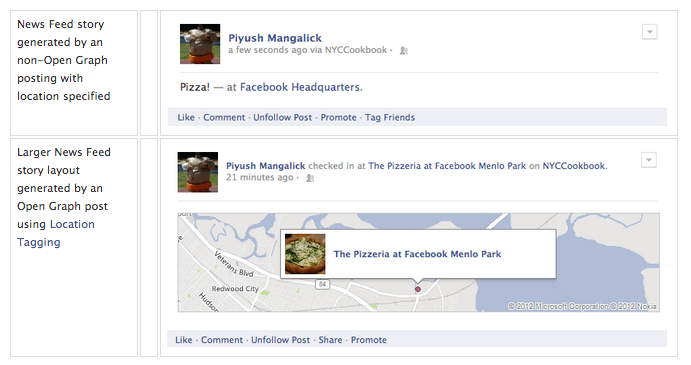Facebook giveth and Facebook taketh. When the company first talked about the Open Graph at the last f8 developer conference in San Francisco last year, there was the promise of a whole slew of apps that would have many types of actions feeding into the ticker and news feed. The company demonstrated example social cooking apps and running apps (like what you see to the right).
But after more than a year, Facebook is cutting back on the types of actions that are allowed (presumably due to spam or messy use cases). Now apps must use authorized actions like ‘Listen,’ ‘Read,’ ‘Watch,’ ‘Like,’ or ‘Follow’ if they want to automatically publish into the ticker or news feed as they consume content. Developers can still create custom actions like “run” or “cook”, but a user has to click a button in order for that activity to be shared.
The company is also giving additional distribution to news feed updates that have locations or photos tied to them, since these stories can get 70 percent more clicks if they have decent visuals. Facebook’s Henry Zhang wrote that these stories can see up to 50 times more ‘Likes’ than other stories.
Facebook is also cracking down on how apps publish stories on behalf of users — an issue the company has wrestled since the very early days of the platform.
Specifically, they’re cracking down on apps that automatically publish stories back to Facebook as a person consumes content. Apps have to use Facebook’s approved built-in actions like ‘Listening,’ ‘Reading,’ and so on to automatically publish stories back to Facebook. If they have a custom action, they will have to migrate toward one of Facebook’s approved actions listed above in the next 90 days. Or they’ll have to prompt the user to explicitly click a button first in order to share the activity.
Facebook is also cracking down on apps that post to friends’ walls through the API. Developers can still post stories that include friends via user mentions.
Underscoring all of these changes, Facebook updated its platform policies to make developers more directly responsible for the quality of their apps. Developers are responsible for making sure that negative feedback from users (in the form of ‘Hides’) doesn’t break above certain limits.
They updated this section in the policy document:
“Quality of content: you are responsible for providing users with a quality experience and must not confuse, defraud, mislead, spam or surprise users. For example, you must monitor your app’s negative feedback in Application Insights to ensure it stays below our thresholds, avoid excessive advertisements or bugs, and ensure the description of your app is consistent with your app’s content.”

